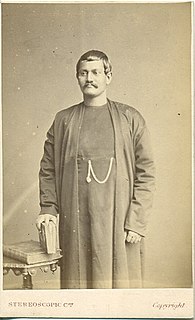A Quote by James Madison
A zeal for different opinions concerning religion, concerning government, and many other points, as well of speculation as of practice; an attachment to different leaders ambitiously contending for pre-eminence and power; or to persons of other descriptions whose fortunes have been interesting to the human passions, have, in turn, divided mankind into parties, inflamed them with mutual animosity, and rendered them much more disposed to vex and oppress each other than to co-operate for their common good.
Quote Topics
Animosity
Attachment
Been
Common
Common Good
Concerning
Contending
Descriptions
Different
Different Opinions
Divided
Each
Eminence
Fortunes
Good
Government
Human
Interesting
Leaders
Mankind
Many
More
Much
Mutual
Operate
Opinions
Other
Parties
Passions
Persons
Points
Power
Practice
Religion
Rendered
Speculation
Than
Them
Turn
Vex
Well
Whose
Zeal
Related Quotes
But concerning vision alone is a separate science formed among philosophers, namely, optics, and not concerning any other sense ... It is possible that some other science may be more useful, but no other science has so much sweetness and beauty of utility. Therefore it is the flower of the whole of philosophy and through it, and not without it, can the other sciences be known.
In republican government the legislative authority necessarily predominates. The remedy for this . . . is to divide the legislature into different branches; and to render them by different modes of election, and different principles of action, as little connected with each other as the nature of their common functions, and their common dependence on the society, will admit.
What is a Poet? He is a man speaking to men: a man, it is true, endued with more lively sensibility, more enthusiasm and tenderness, who has a greater knowledge of human nature, and a more comprehensive soul, than are supposed to be common among mankind; a man pleased with his own passions and volitions, and who rejoices more than other men in the spirit of life that is in him; delighting to contemplate similar volitions and passions as manifested in the goings-on of the universe, and habitually impelled to create them where he does not find them.
For me the Jewish religion like all others is an incarnation of the most childish superstitions, and the Jewish people to whom I gladly belong and with whose mentality I have a deep affinity have no different quality for me than all other people. As far as my experience goes, they are no better than other human groups, although they are protected from the worst cancers by a lack of power. Otherwise I cannot see anything chosen about them.
Two persons who have chosen each other out of all the species with a design to be each other's mutual comfort and entertainment have, in that action, bound themselves to be good-humored, affable, discreet, forgiving, patient, and joyful, with respect to each other's frailties and perfections, to the end of their lives.
There are so many different kinds of people in America, with so many different boiling points, that we don't know how to fight with each other. The set piece that shapes and contains quarrels in homogeneous countries does not exist here. The Frenchman is an expert on the precise gradations of espèce de and the Italian knows exactly when to introduce the subject of his other's grave, but no American can be sure how or when another will react, so we zap each other with friendliness to neutralize potentially dangerous situations.
It is probably true quite generally that in the history of human thinking the most fruitful developments frequently take place at those points where two different lines of thought meet. These lines may have their roots in quite different parts of human nature, in different times or different cultural environments or different religious traditions: hence if they actually meet, that is, if they are at least so much related to each other that a real interaction can take place, then one may hope that new and interesting developments may follow.
The true object of religion is to bind mankind together, and to bind them all to God. If we see that in the name of religion, men, instead of promoting peace on earth and good-will among men, are trying to show their antagonism and animosity towards each other, then certainly we must stand forward with our voice of protest, and say that religion is defeating its own legitimate object.
When you label somebody and put them in a box, then you put the lid on the box, and you just never look inside again. I think it's much more interesting for human beings to look at each other's stories and see each other. Really see each other and then see themselves through other people's stories. That's where you start to break down stereotypes.
































